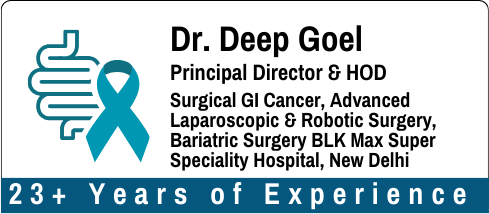Colorectal Cancer Screening: Why Early Detection Can Save Your Life?

Colorectal cancer is one of the most common yet also one of the most preventable types of cancer worldwide. Many lives are lost not because treatment is unavailable, but because the disease wasn’t detected early enough. In its early stages, colorectal cancer often shows no symptoms, making regular screening all the more critical.
Colorectal cancer screening is a powerful, life-saving tool, yet it’s often delayed due to fear, confusion, or lack of awareness about when to begin.
Dr. Deep Goel explains, “The tragedy with colorectal cancer is that it’s often silent until it reaches an advanced stage. Screening is our best opportunity to find it early or even prevent it entirely.”
In this blog, we’ll explain why early detection is vital, who should be screened, and how timely screening can protect your health and potentially save your life.
What Is Colorectal Cancer?
Colorectal cancer refers to cancer that starts in the colon or rectum, parts of the large intestine. It usually begins as small, non-cancerous growths called polyps that can turn into cancer over time if left untreated.
According to the World Health Organization (WHO), it is the third most commonly diagnosed cancer worldwide, and the second leading cause of cancer-related deaths.
But when caught early, the 5-year survival rate can be as high as 90%. That’s why early detection of colorectal cancer is so important.
Why Early Screening Matters?
Many people associate cancer detection with symptoms, but colorectal cancer often develops silently. In its early stages, it may cause no noticeable symptoms at all.
By the time symptoms appear, such as changes in bowel habits, rectal bleeding, or unexplained weight loss, the disease may already be advanced. That’s why waiting for signs could be dangerous.
Screening Saves Lives by:
- Finding cancer early: Before it spreads and while treatment is more effective.
- Preventing cancer: By removing precancerous polyps before they turn into cancer.
- Reducing mortality rates: Studies show routine screening significantly reduces deaths from colorectal cancer.
Dr. Deep Goel adds, “Early screening doesn’t just detect cancer, it can stop it before it starts. The few minutes you invest in a screening test could mean decades of healthy life ahead.”
Types of Colorectal Cancer Screening Tests
There are several types of screening tests available for colorectal cancer. Some are simple stool tests you can do at home, while others require a short outpatient procedure. The right test depends on your age, risk factors, health condition, and personal preference. Here’s a breakdown of the most commonly used screening methods:
1. Colonoscopy – The Gold Standard
Colonoscopy for cancer detection is the most comprehensive method available. It not only identifies cancer but also helps in removing polyps during the procedure.
- Frequency: Every 10 years if normal
- Prep: Yes (bowel cleansing)
- Anesthesia: Light sedation
It’s the only test that both detects and prevents cancer in one procedure.
2. Fecal Immunochemical Test (FIT)
The FIT is a non-invasive at-home stool test that detects hidden (occult) blood in the stool, which may indicate cancer or large polyps. It’s quick, painless, and requires no dietary changes.
- Frequency: Once a year.
- Preparation: Simply collect a small stool sample and send it to the lab.
3. Stool DNA Test (e.g., Cologuard)
This test combines stool DNA analysis with a FIT to detect both blood and abnormal DNA mutations that may indicate the presence of cancer or precancerous growths.
- Frequency: Every 3 years if results are normal.
- Preparation: Sample collection is done at home.
4. Flexible Sigmoidoscopy
A test that uses a thin, flexible tube with a camera to examine only the lower part of the colon (sigmoid colon and rectum). It’s less invasive than a colonoscopy and can detect and remove small polyps.
- Frequency: Every 5 years, or every 10 years if combined with yearly FIT.
- Preparation: Mild bowel prep (enema or partial cleansing); usually no sedation required.
A patient of Dr. Deep Goel shared, “I went for a routine colorectal cancer screening with no symptoms at all. During the colonoscopy, doctors found and removed two precancerous polyps. The procedure was smooth, and I was back home the same day. I’m relieved knowing I prevented cancer before it even started.”
Early Signs of Colorectal Cancer to Watch For
While screening is the most reliable way to detect cancer early, being aware of warning signs can prompt you to seek medical attention sooner:
- Persistent changes in bowel habits (diarrhea, constipation, or narrow stools)
- Rectal bleeding or blood in stool
- Unexplained weight loss
- Ongoing abdominal discomfort, gas, or cramps
- Weakness or fatigue
These symptoms can also be caused by other conditions, but they should never be ignored.
Another patient shared, “I ignored occasional blood in my stool for months. When I finally got a colonoscopy, I was diagnosed with stage II colorectal cancer. Surgery and chemotherapy followed, and today I’m cancer-free. I wish I had gone for screening earlier; it truly can save lives.”
Overcoming Fear and Misconceptions About Screening
Many people avoid colon cancer screening due to:
- Fear of discomfort
- Embarrassment
- Misunderstanding about the procedure
- Belief that screening is only needed if symptoms appear
The reality is that screening is quick, safe, and can save your life. For example, a colonoscopy typically takes less than 30 minutes, and most people resume normal activities the next day.
Dr. Deep Goel reassures, “Screening is far easier than treating advanced cancer. One short procedure can spare you from months of aggressive treatment later.”
Final Thoughts
Colorectal cancer is highly preventable and treatable, but only if caught early. The importance of colorectal cancer screening lies in its power to detect the disease before symptoms develop, making treatment simpler, less invasive, and far more successful.
If you’re 45 or older, or younger with risk factors, take the right screening regularly. Whether it’s a colonoscopy for cancer detection or a less invasive option, taking action today could save your life tomorrow.
FAQS about Colon Cancer Treatment
1) How do I know which colorectal cancer screening test is right for me?
The doctor will recommend a test based on your age, family history, health condition, and personal preference.
2) Can I eat normally before a colorectal cancer screening?
For most stool-based tests, yes. For a colonoscopy, you’ll need to follow a special diet and bowel prep the day before.
3) Is at-home colorectal cancer screening effective?
Yes, at-home tests like FIT or stool DNA tests can be effective for average-risk patients, but abnormal results require a colonoscopy.
4) How long does it take to get results from a screening?
Results from stool-based tests usually arrive in a few days, while colonoscopy results may take a week if biopsies are done.
5) Can lifestyle changes reduce my need for frequent screening?
A healthy diet, regular exercise, and avoiding smoking lower your risk, but screening is still essential.
Explore more blogs: What Are the Different Surgical Options for Colon Cancer?

